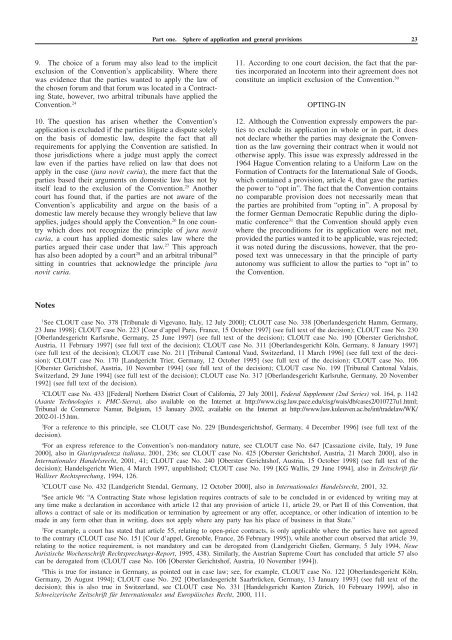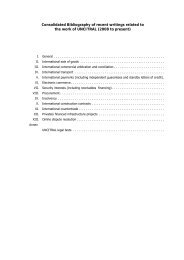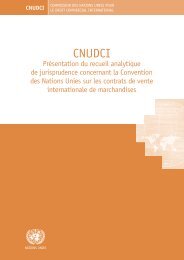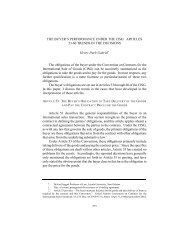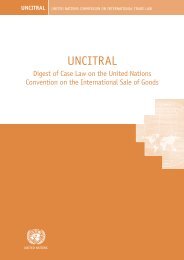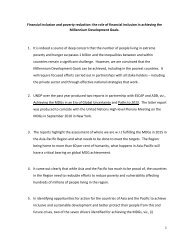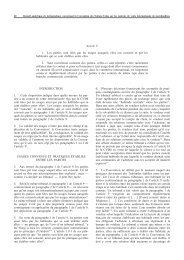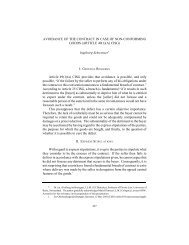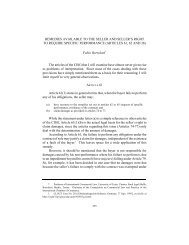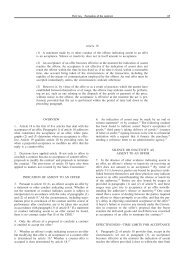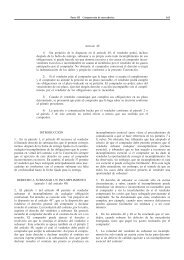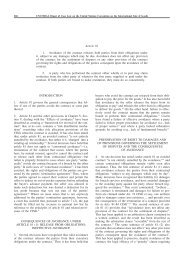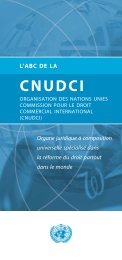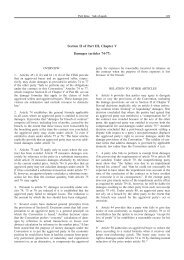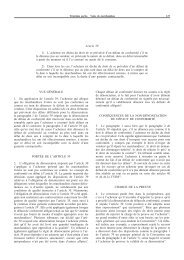Article 6 The parties may exclude the application of this ... - uncitral
Article 6 The parties may exclude the application of this ... - uncitral
Article 6 The parties may exclude the application of this ... - uncitral
You also want an ePaper? Increase the reach of your titles
YUMPU automatically turns print PDFs into web optimized ePapers that Google loves.
Part one. Sphere <strong>of</strong> <strong>application</strong> and general provisions 23<br />
9. <strong>The</strong> choice <strong>of</strong> a forum <strong>may</strong> also lead to <strong>the</strong> implicit<br />
exclusion <strong>of</strong> <strong>the</strong> Convention’s applicability. Where <strong>the</strong>re<br />
was evidence that <strong>the</strong> <strong>parties</strong> wanted to apply <strong>the</strong> law <strong>of</strong><br />
<strong>the</strong> chosen forum and that forum was located in a Contracting<br />
State, however, two arbitral tribunals have applied <strong>the</strong><br />
Convention. 24<br />
10. <strong>The</strong> question has arisen whe<strong>the</strong>r <strong>the</strong> Convention’s<br />
<strong>application</strong> is <strong>exclude</strong>d if <strong>the</strong> <strong>parties</strong> litigate a dispute solely<br />
on <strong>the</strong> basis <strong>of</strong> domestic law, despite <strong>the</strong> fact that all<br />
requirements for applying <strong>the</strong> Convention are satisfied. In<br />
those jurisdictions where a judge must apply <strong>the</strong> correct<br />
law even if <strong>the</strong> <strong>parties</strong> have relied on law that does not<br />
apply in <strong>the</strong> case (jura novit curia), <strong>the</strong> mere fact that <strong>the</strong><br />
<strong>parties</strong> based <strong>the</strong>ir arguments on domestic law has not by<br />
itself lead to <strong>the</strong> exclusion <strong>of</strong> <strong>the</strong> Convention. 25 Ano<strong>the</strong>r<br />
court has found that, if <strong>the</strong> <strong>parties</strong> are not aware <strong>of</strong> <strong>the</strong><br />
Convention’s applicability and argue on <strong>the</strong> basis <strong>of</strong> a<br />
domestic law merely because <strong>the</strong>y wrongly believe that law<br />
applies, judges should apply <strong>the</strong> Convention. 26 In one country<br />
which does not recognize <strong>the</strong> principle <strong>of</strong> jura novit<br />
curia, a court has applied domestic sales law where <strong>the</strong><br />
<strong>parties</strong> argued <strong>the</strong>ir case under that law. 27 This approach<br />
has also been adopted by a court 28 and an arbitral tribunal 29<br />
sitting in countries that acknowledge <strong>the</strong> principle jura<br />
novit curia.<br />
11. According to one court decision, <strong>the</strong> fact that <strong>the</strong> <strong>parties</strong><br />
incorporated an Incoterm into <strong>the</strong>ir agreement does not<br />
constitute an implicit exclusion <strong>of</strong> <strong>the</strong> Convention. 30<br />
OPTING-IN<br />
12. Although <strong>the</strong> Convention expressly empowers <strong>the</strong> <strong>parties</strong><br />
to <strong>exclude</strong> its <strong>application</strong> in whole or in part, it does<br />
not declare whe<strong>the</strong>r <strong>the</strong> <strong>parties</strong> <strong>may</strong> designate <strong>the</strong> Convention<br />
as <strong>the</strong> law governing <strong>the</strong>ir contract when it would not<br />
o<strong>the</strong>rwise apply. This issue was expressly addressed in <strong>the</strong><br />
1964 Hague Convention relating to a Uniform Law on <strong>the</strong><br />
Formation <strong>of</strong> Contracts for <strong>the</strong> International Sale <strong>of</strong> Goods,<br />
which contained a provision, article 4, that gave <strong>the</strong> <strong>parties</strong><br />
<strong>the</strong> power to “opt in”. <strong>The</strong> fact that <strong>the</strong> Convention contains<br />
no comparable provision does not necessarily mean that<br />
<strong>the</strong> <strong>parties</strong> are prohibited from “opting in”. A proposal by<br />
<strong>the</strong> former German Democratic Republic during <strong>the</strong> diplomatic<br />
conference 31 that <strong>the</strong> Convention should apply even<br />
where <strong>the</strong> preconditions for its <strong>application</strong> were not met,<br />
provided <strong>the</strong> <strong>parties</strong> wanted it to be applicable, was rejected;<br />
it was noted during <strong>the</strong> discussions, however, that <strong>the</strong> proposed<br />
text was unnecessary in that <strong>the</strong> principle <strong>of</strong> party<br />
autonomy was sufficient to allow <strong>the</strong> <strong>parties</strong> to “opt in” to<br />
<strong>the</strong> Convention.<br />
Notes<br />
1<br />
See CLOUT case No. 378 [Tribunale di Vigevano, Italy, 12 July 2000]; CLOUT case No. 338 [Oberlandesgericht Hamm, Germany,<br />
23 June 1998]; CLOUT case No. 223 [Cour d’appel Paris, France, 15 October 1997] (see full text <strong>of</strong> <strong>the</strong> decision); CLOUT case No. 230<br />
[Oberlandesgericht Karlsruhe, Germany, 25 June 1997] (see full text <strong>of</strong> <strong>the</strong> decision); CLOUT case No. 190 [Oberster Gerichtsh<strong>of</strong>,<br />
Austria, 11 February 1997] (see full text <strong>of</strong> <strong>the</strong> decision); CLOUT case No. 311 [Oberlandesgericht Köln, Germany, 8 January 1997]<br />
(see full text <strong>of</strong> <strong>the</strong> decision); CLOUT case No. 211 [Tribunal Cantonal Vaud, Switzerland, 11 March 1996] (see full text <strong>of</strong> <strong>the</strong> decision);<br />
CLOUT case No. 170 [Landgericht Trier, Germany, 12 October 1995] (see full text <strong>of</strong> <strong>the</strong> decision); CLOUT case No. 106<br />
[Oberster Gerichtsh<strong>of</strong>, Austria, 10 November 1994] (see full text <strong>of</strong> <strong>the</strong> decision); CLOUT case No. 199 [Tribunal Cantonal Valais,<br />
Switzerland, 29 June 1994] (see full text <strong>of</strong> <strong>the</strong> decision); CLOUT case No. 317 [Oberlandesgericht Karlsruhe, Germany, 20 November<br />
1992] (see full text <strong>of</strong> <strong>the</strong> decision).<br />
2<br />
CLOUT case No. 433 [[Federal] Nor<strong>the</strong>rn District Court <strong>of</strong> California, 27 July 2001], Federal Supplement (2nd Series) vol. 164, p. 1142<br />
(Asante Technologies v. PMC-Sierra), also available on <strong>the</strong> Internet at http://www.cisg.law.pace.edu/cisg/wais/db/cases2/010727u1.html;<br />
Tribunal de Commerce Namur, Belgium, 15 January 2002, available on <strong>the</strong> Internet at http://www.law.kuleuven.ac.be/int/tradelaw/WK/<br />
2002-01-15.htm.<br />
3<br />
For a reference to <strong>this</strong> principle, see CLOUT case No. 229 [Bundesgerichtsh<strong>of</strong>, Germany, 4 December 1996] (see full text <strong>of</strong> <strong>the</strong><br />
decision).<br />
4<br />
For an express reference to <strong>the</strong> Convention’s non-mandatory nature, see CLOUT case No. 647 [Cassazione civile, Italy, 19 June<br />
2000], also in Giurisprudenza italiana, 2001, 236; see CLOUT case No. 425 [Oberster Gerichtsh<strong>of</strong>, Austria, 21 March 2000], also in<br />
Internationales Handelsrecht, 2001, 41; CLOUT case No. 240 [Oberster Gerichtsh<strong>of</strong>, Austria, 15 October 1998] (see full text <strong>of</strong> <strong>the</strong><br />
decision); Handelsgericht Wien, 4 March 1997, unpublished; CLOUT case No. 199 [KG Wallis, 29 June 1994], also in Zeitschrift für<br />
Walliser Rechtsprechung, 1994, 126.<br />
5<br />
CLOUT case No. 432 [Landgericht Stendal, Germany, 12 October 2000], also in Internationales Handelsrecht, 2001, 32.<br />
6<br />
See article 96: “A Contracting State whose legislation requires contracts <strong>of</strong> sale to be concluded in or evidenced by writing <strong>may</strong> at<br />
any time make a declaration in accordance with article 12 that any provision <strong>of</strong> article 11, article 29, or Part II <strong>of</strong> <strong>this</strong> Convention, that<br />
allows a contract <strong>of</strong> sale or its modification or termination by agreement or any <strong>of</strong>fer, acceptance, or o<strong>the</strong>r indication <strong>of</strong> intention to be<br />
made in any form o<strong>the</strong>r than in writing, does not apply where any party has his place <strong>of</strong> business in that State.”<br />
7<br />
For example, a court has stated that article 55, relating to open-price contracts, is only applicable where <strong>the</strong> <strong>parties</strong> have not agreed<br />
to <strong>the</strong> contrary (CLOUT case No. 151 [Cour d’appel, Grenoble, France, 26 February 1995]), while ano<strong>the</strong>r court observed that article 39,<br />
relating to <strong>the</strong> notice requirement, is not mandatory and can be derogated from (Landgericht Gießen, Germany, 5 July 1994, Neue<br />
Juristische Wochenschrift Rechtsprechungs-Report, 1995, 438). Similarly, <strong>the</strong> Austrian Supreme Court has concluded that article 57 also<br />
can be derogated from (CLOUT case No. 106 [Oberster Gerichtsh<strong>of</strong>, Austria, 10 November 1994]).<br />
8<br />
This is true for instance in Germany, as pointed out in case law; see, for example, CLOUT case No. 122 [Oberlandesgericht Köln,<br />
Germany, 26 August 1994]; CLOUT case No. 292 [Oberlandesgericht Saarbrücken, Germany, 13 January 1993] (see full text <strong>of</strong> <strong>the</strong><br />
decision); <strong>this</strong> is also true in Switzerland, see CLOUT case No. 331 [Handelsgericht Kanton Zürich, 10 February 1999], also in<br />
Schweizerische Zeitschrift für Internationales und Europäisches Recht, 2000, 111.


